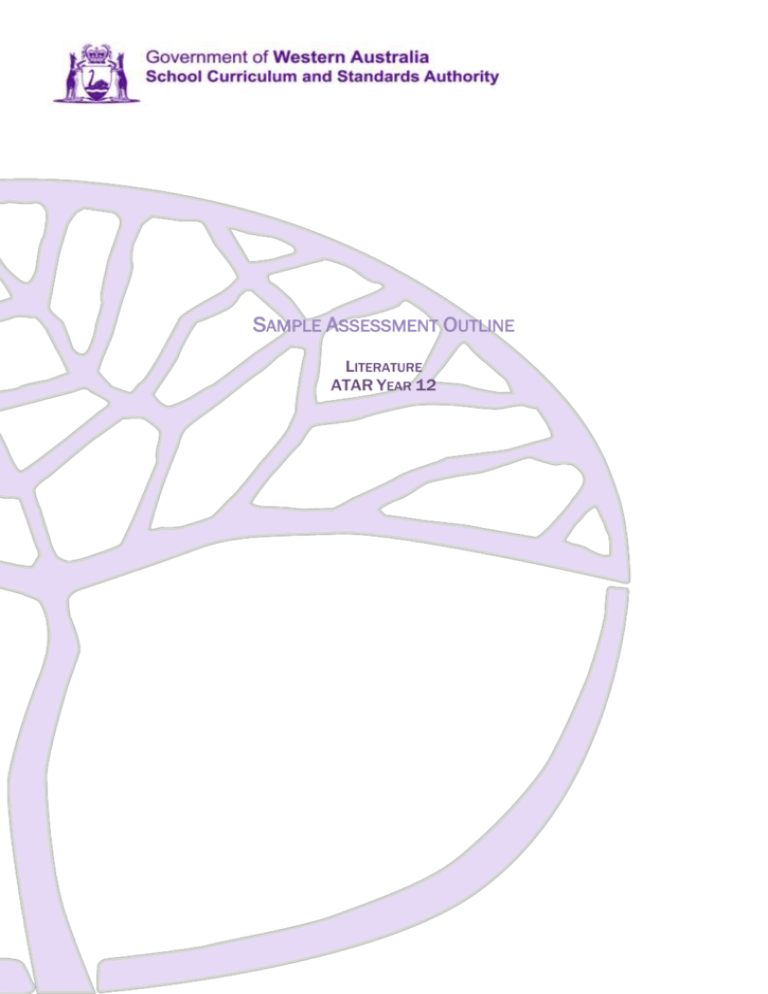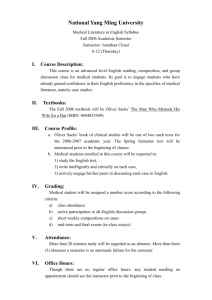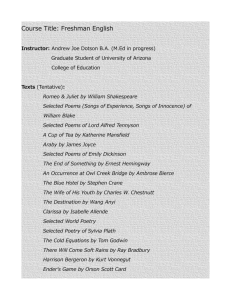SAMPLE ASSESSMENT OUTLINE
advertisement

SAMPLE ASSESSMENT OUTLINE LITERATURE ATAR YEAR 12 Copyright © School Curriculum and Standards Authority, 2015 This document – apart from any third party copyright material contained in it – may be freely copied, or communicated on an intranet, for non-commercial purposes in educational institutions, provided that the School Curriculum and Standards Authority is acknowledged as the copyright owner, and that the Authority’s moral rights are not infringed. Copying or communication for any other purpose can be done only within the terms of the Copyright Act 1968 or with prior written permission of the School Curriculum and Standards Authority. Copying or communication of any third party copyright material can be done only within the terms of the Copyright Act 1968 or with permission of the copyright owners. Any content in this document that has been derived from the Australian Curriculum may be used under the terms of the Creative Commons Attribution-NonCommercial 3.0 Australia licence Disclaimer Any resources such as texts, websites and so on that may be referred to in this document are provided as examples of resources that teachers can use to support their learning programs. Their inclusion does not imply that they are mandatory or that they are the only resources relevant to the course. 2015/47322v4 1 Sample assessment outline Literature – ATAR Year 12 Unit 3 and Unit 4 Assessment type Extended written response Short written response Assessment type weighting Assessment task weighting Due date 7.5% Semester 1 Week 9 7.5% Semester 2 Week 10 5% Semester 1 Week 4 5% Semester 1 Week 5 5% Semester 1 Week 7 5% Semester 1 Week 12 5% Semester 2 Week 2 5% Semester 2 Week 4 15% 35% Assessment task Task 5: Drama Written by a Western Australian author, set in WA, and incorporating information about key people and events in WA history, No Sugar enables us as readers to view a representation of our cultural past. Discuss the representation of Australian culture, place and identity in No Sugar, considering how your context and cultural assumptions influence your reading. Task 13: Prose How has Gail Jones used specific literary elements to shape meaning and achieve ideological, aesthetic and/or social purposes in Sorry? Task 2: Poetry – Close reading – in-class assessment You will present a close reading of a previously unseen poem. Task 3: Poetry – in-class assessment Essay on Gwen Harwood's poetry – respond to one unseen essay question from a choice of two provided. Task 4: Drama – in-class assessment Write an essay in response to a previously unseen question that will require you to discuss the use of language and dramatic conventions used in the exposition to the play. Look closely at Act 1, Scene 2 in preparation. Task 6: Prose – Close reading – in-class assessment You will be provided with an extract from Heart of Darkness. Apply a close reading from a post-colonial perspective to the selected section. Task 9: Drama – Close reading – in-class assessment You will complete a close reading of an unseen passage during one lesson of class time. Task 10: Drama – in-class assessment Discuss the ways in which ideological perspectives are conveyed in The Tempest and if these views remain relevant for a contemporary audience. Sample assessment outline | Literature | ATAR Year 12 2 Assessment type Creative production of literary texts Oral Assessment type weighting Assessment task weighting 5% Semester 2 Week 12 5% Semester 1 Week 2 5% Semester 2 Week 5 5% Semester 1 Week 13 5% Semester 2 Week 8–9 10% 10% 10% Examination 30% 20% Total Due date 100% Examination week Examination week 100% Sample assessment outline | Literature | ATAR Year 12 Assessment task Task 14: Poetry – in-class assessment Part A: You will be provided with a range of questions in the style you can expect in Section Two of the WACE examination. Choose one question and respond using poetry as your primary text focus. Part B: To be done in the lesson following the in-class essay: You will be given 20 minutes to write a reflective evaluation of your own response, considering how you approached the task, the selection of question, structure of your response, the content you included, your use of direct evidence from the text, your use of literary terms, your time management, and anything further you think is relevant. Task 1: Produce a piece of creative writing that challenges conventions either in content, form, style or medium. You may consider merging forms, as the essays in 'Memoir Intervention' do with the incorporation of poetry within reflective essays, or you may alter a form in another way. Alternatively you may consider representation of characters, culture or place in an unexpected way, like some of the stories and poems studied have done, or may experiment with writing from a different cultural or gender position, as Gwen Harwood is described to have done. Task 11: Literary texts often respond to specific events within society or use the text to comment on or reflect cultural issues. Authors may also manipulate conventions of texts to draw reference to other texts, or for aesthetic purposes. Using a recent newsworthy event or cultural issue as stimulus for your writing, create a literary text that presents an alternative perspective to that shown in the mainstream news. Provide either a copy of a news item or a reference to indicate what news item or cultural issue you are using as your stimulus. Write a brief reflection on what you were trying to achieve with the text and how you considered the expectations of audiences. Task 7: Close reading – choice of genre Present a close reading of either a Gwen Harwood poem, or a scene from No Sugar, or an extract from Heart of Darkness. Your oral presentation should be accompanied by notes or annotations in multimodal form and/or in a handout that can be distributed to the class. Your text choice must not be a poem, scene or extract that has previously been analysed in class. Task 12: Prose Select one topic from the list of options and present an oral presentation of 8–10 minutes, providing references from Sorry to support your points. Each student will be given a presentation date between weeks 8–9, depending on the topic of their presentation. Task 8: Semester 1 examination Task 15: Semester 2 examination





